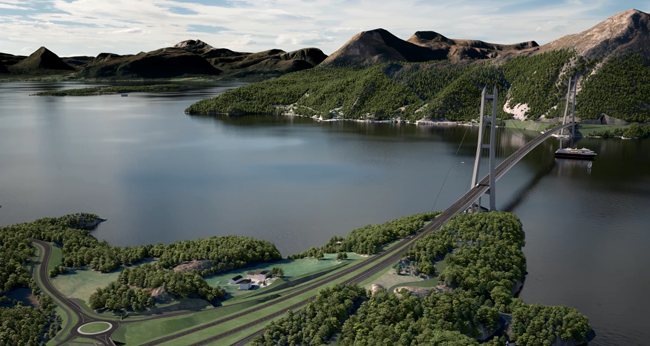The largest road project in Norway’s history has seen Fugro win a second major contract from the Norwegian Public Roads Administration (NPRA). The work on the E39 Coastal Highway is for the construction of a 1,100km route from Kristiansand in the south to Trondheim in central Norway. This project is expected cost around €34.4 billion (NOK 340 billion).

The new coastal route will improve transport for Norway. E39 Orthomap Courtesy of Norwegian Public Roads Administration (NPRA)
The largest road project in Norway’s history has seen 6202 Fugro win a second major contract from the Norwegian Public Roads Administration (NPRA). The work on the E39 Coastal Highway is for the construction of a 1,100km route from Kristiansand in the south to Trondheim in central Norway. This project is expected cost around €34.4 billion (NOK 340 billion).
Fugro is set to begin a year-long contract, valued at approximately €7.7 million (NOK 76 million), to carry out seabed investigations in four fjord locations where vast engineering projects are planned. The fjords - Vartdalsfjorden, Sulafjorden, Romsdalsfjorden and Halsafjorden – are in the county of Møre og Romsdal. The work is in addition to a 12-year environmental measurement programme relating to the major route, won by Fugro in 2016.
The geophysical and geotechnical data acquired by Fugro will help inform foundation designs of the bridge and tunnel solutions for the fjord crossings along the coastal route. Above and below sea level tunnels; an end-anchored floating bridge; a submerged floating tube bridge; and multi-span suspension bridge are amongst the innovative solutions being considered by NPRA to provide an improved E39 without ferries (currently seven ferries are used along the route). The new Coastal Highway will be almost 50km shorter and will cut in half the current journey time of around 21 hours.
Fugro’s work is split into two phases. Phase 1 encompasses geophysical mapping of the fjord-crossing areas and two vessels will be used to acquire geophysical and shallow geotechnical data. Survey vessel Fugro Helmert will cover shallow, nearshore areas to acquire multi-channel sparker data. From the second vessel Fugro will acquire detailed geophysical data in the deeper parts of the fjords using a remotely operated vehicle (ROV) and will also undertake seabed sampling and cone penetration testing.
With a planned start date of August 2018, phase 2 will see Fugro perform geotechnical drilling at selected locations as defined by the geophysical data acquired in the first phase. For deeper geotechnical drilling during phase 2, the high-tech drillship Fugro Synergy will be introduced.
“We started working with NPRA on the E39 Coastal Highway project last summer with a long-term programme to measure wind profiles, ocean waves and current profiles at three fjords,” explained Dag Sigurd Stensholt, Fugro’s business development manager in Norway. “It makes us very proud to add our marine site characterisation services to such a huge and important venture.”
Fugro is set to begin a year-long contract, valued at approximately €7.7 million (NOK 76 million), to carry out seabed investigations in four fjord locations where vast engineering projects are planned. The fjords - Vartdalsfjorden, Sulafjorden, Romsdalsfjorden and Halsafjorden – are in the county of Møre og Romsdal. The work is in addition to a 12-year environmental measurement programme relating to the major route, won by Fugro in 2016.
The geophysical and geotechnical data acquired by Fugro will help inform foundation designs of the bridge and tunnel solutions for the fjord crossings along the coastal route. Above and below sea level tunnels; an end-anchored floating bridge; a submerged floating tube bridge; and multi-span suspension bridge are amongst the innovative solutions being considered by NPRA to provide an improved E39 without ferries (currently seven ferries are used along the route). The new Coastal Highway will be almost 50km shorter and will cut in half the current journey time of around 21 hours.
Fugro’s work is split into two phases. Phase 1 encompasses geophysical mapping of the fjord-crossing areas and two vessels will be used to acquire geophysical and shallow geotechnical data. Survey vessel Fugro Helmert will cover shallow, nearshore areas to acquire multi-channel sparker data. From the second vessel Fugro will acquire detailed geophysical data in the deeper parts of the fjords using a remotely operated vehicle (ROV) and will also undertake seabed sampling and cone penetration testing.
With a planned start date of August 2018, phase 2 will see Fugro perform geotechnical drilling at selected locations as defined by the geophysical data acquired in the first phase. For deeper geotechnical drilling during phase 2, the high-tech drillship Fugro Synergy will be introduced.
“We started working with NPRA on the E39 Coastal Highway project last summer with a long-term programme to measure wind profiles, ocean waves and current profiles at three fjords,” explained Dag Sigurd Stensholt, Fugro’s business development manager in Norway. “It makes us very proud to add our marine site characterisation services to such a huge and important venture.”








